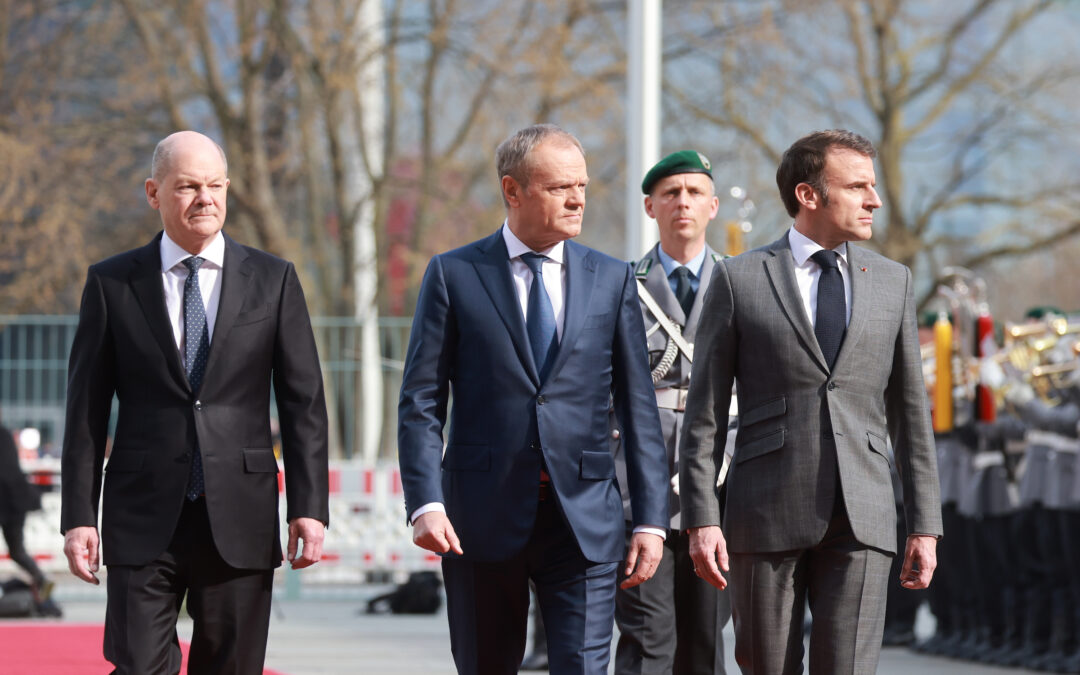Keep our news free from ads and paywalls by making a donation to support our work!

Notes from Poland is run by a small editorial team and is published by an independent, non-profit foundation that is funded through donations from our readers. We cannot do what we do without your support.
France, Germany and Poland have issued a joint statement expressing concern at the conduct of recent elections in Georgia and calling for irregularities to be investigated.
The statement, published as leaders of 42 European countries, including Georgia, gathered in Budapest yesterday for a meeting of the European Political Community (EPC), was issued in the name of French President Emmanual Macron, German Chancellor Olaf Scholz and Polish Prime Minister Donald Tusk.
“We reiterate our concern about the conduct of the parliamentary elections in Georgia…in particular the reported numerous irregularities and intimidation on [sic] voters,” read the statement. “We call for the swift and transparent investigations of complaints and reports of election-related irregularities.”
Joint statement of the Weimar Triangle countries on Georgia 🇬🇪 by @donaldtusk , @EmmanuelMacron &@Bundeskanzler . pic.twitter.com/9W9kDtxn0N
— PLinGEORGIA (@PLinGEORGIA) November 7, 2024
“We support the democratic and European aspirations of the Georgian people,” added the leaders. “[But] unless Georgia reverses its current course of action and demonstrates tangible reform efforts…we will not be in a position to support the opening of [EU] accession negotiations with Georgia.”
In particular, the trio called on Georgia to “repeal recent legislation that runs counter to European values” – a presumed reference to the “foreign agent” law passed earlier this year that prompted mass protests by Georgians, who said it threatened civil liberties and was modelled on measures in Russia.
At the 26 October elections, the ruling Georgian Dream party, which is seen as sympathetic towards Russia, won with almost 54% of the vote. However, election observers from a number of European institutions highlighted various irregularities in the conduct of the vote.
The OSCE pointed to “incidents of attacks and intimidation” during the elections. Iulian Bulai, the head of a monitoring delegation from the Parliamentary Assembly of the Council of Europe, pointed to a “widespread climate of pressure and party-organized intimidation”.
International observers documented vote buying and double voting in Georgia's parliamentary elections on October 26, the head of an observation mission said. Iulian Bulai, leading a delegation sent by the Parliamentary Assembly of the Council of Europe, spoke at a news conference… pic.twitter.com/WUjL9wR5aD
— Radio Free Europe/Radio Liberty (@RFERL) October 27, 2024
A number of European leaders have already called for an investigation into the conduct of the elections, including European Council President Charles Michel and Poland’s President Andrzej Duda.
Georgia’s own president, Salome Zourabichvili, has also said that she does not recognise the results of the elections. “It would be the same as recognising Russia’s entry here – Georgian subordination to Russia,” she said, quoted by RFE/RL.
However, Georgian Dream has denied that there were any systematic irregularities that undermine the validity of the vote. The first foreign leader to congratulate the party on its victory was Hungary’s Victor Orbán, who hosted yesterday’s summit in Budapest.
Poland's President Duda has called for an international investigation into Georgia's elections "to find out the scale of the falsification of the results, because there is no doubt it happened".
He noted that Russia "resolutely supports" the ruling party https://t.co/SHfoligWaT
— Notes from Poland 🇵🇱 (@notesfrompoland) October 29, 2024

Notes from Poland is run by a small editorial team and published by an independent, non-profit foundation that is funded through donations from our readers. We cannot do what we do without your support.
Main image credit: KPRM (under CC BY 3.0 PL)

Daniel Tilles is editor-in-chief of Notes from Poland. He has written on Polish affairs for a wide range of publications, including Foreign Policy, POLITICO Europe, EUobserver and Dziennik Gazeta Prawna.



















